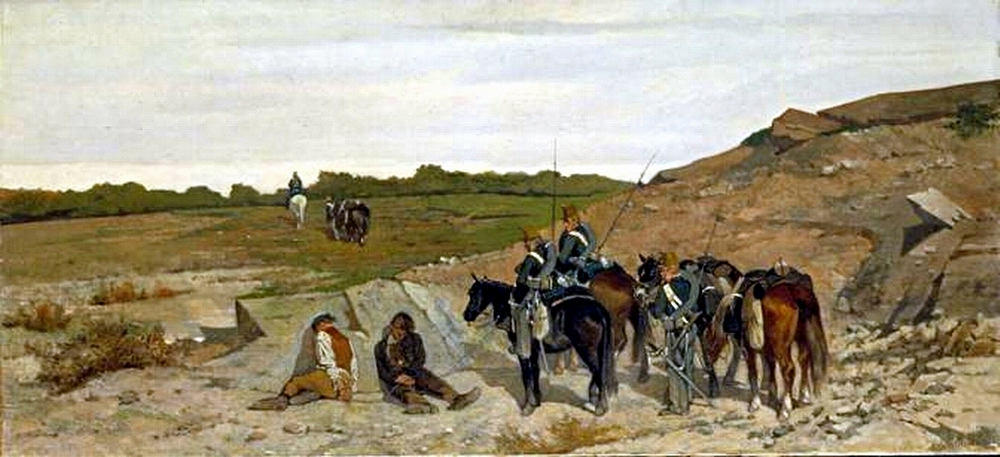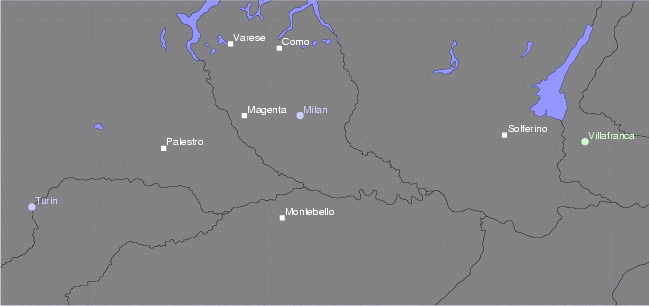|
Giuseppe Govone
Giuseppe Gaetano Maria Govone (Isola d'Asti, 1825 – Alba, Italy, January 1872) was an Italian general and politician of Piedmontese origin, who played a major role in the Italian Risorgimento. An officer ahead of his time, he took part in the three Wars of Independence and distinguished himself as Minister of War in the government of Giovanni Lanza. Family First Italian War of Independence As a junior staff officer, First Lieutenant Giuseppe Govone took part in the battles of Pastrengo, Peschiera, and Cerlungo. Promoted to captain, he joined the staff of General Alfonso La Marmora's 6th Division. In 1849, the 6th Division suppressed the republican Rebellion of Genoa, which broke out as a consequence of the Armistice of Vignale with Austria after the Battle of Novara. In this action, Govone was able without fighting to take control of three forts on the outskirts of Genoa. For his actions in the First Italian War of Independence, Govone was awarded two silver medals. Cr ... [...More Info...] [...Related Items...] OR: [Wikipedia] [Google] [Baidu] |
Battle Of Magenta
The Battle of Magenta was fought on 4 June 1859 near the town of Magenta in the Kingdom of Lombardy–Venetia, a crown land of the Austrian Empire, during the Second Italian War of Independence. It resulted in a French-Sardinian victory under Napoleon III against the Austrians under Marshal Ferenc Gyulay. Napoleon III's army crossed the Ticino River and outflanked the Austrian right forcing the Austrian army under Gyulay to retreat. The confined nature of the country, a vast spread of orchards cut up by streams and irrigation canals, precluded elaborate manoeuvre. The Austrians turned every house into a miniature fortress. The brunt of the fighting was borne by 5,000 grenadiers of the French Imperial Guard, still mostly in their First Empire style of uniforms. The battle of Magenta was not a particularly large battle, but it was a decisive victory for the Franco-Sardinian alliance. Patrice de MacMahon was created Duke of Magenta for his role in this battle, and would later ... [...More Info...] [...Related Items...] OR: [Wikipedia] [Google] [Baidu] |
Carlist
Carlism (; ; ; ) is a Traditionalism (Spain), Traditionalist and Legitimist political movement in Spain aimed at establishing an alternative branch of the Bourbon dynasty, one descended from Infante Carlos María Isidro of Spain, Don Carlos, Count of Molina (1788–1855), on the Spanish throne. The movement was founded as a consequence of an early 19th-century dispute over the succession of the Spanish monarchy and widespread dissatisfaction with the House of Bourbon#Monarchs of Spain, Alfonsine line of the House of Bourbon, and subsequently found itself becoming a notable element of Spanish conservatism in its 19th-century struggle against liberalism, which repeatedly broke out into military conflicts known as the Carlist Wars. Carlism was at its strongest in the 1830s. However, it experienced a revival following Spain's defeat in the Spanish–American War in 1898, when the Spanish Empire lost its last remaining significant overseas territories of the Philippines, Cuba, Gu ... [...More Info...] [...Related Items...] OR: [Wikipedia] [Google] [Baidu] |
House Of Bourbon
The House of Bourbon (, also ; ) is a dynasty that originated in the Kingdom of France as a branch of the Capetian dynasty, the royal House of France. Bourbon kings first ruled France and Kingdom of Navarre, Navarre in the 16th century. A branch descended from the French Bourbons came to rule Spain in the 18th century and is the current Spanish royal family. Other branches, descended from the Spanish Bourbons, held thrones in Kingdom of Naples, Naples, Kingdom of Sicily, Sicily, and Duchy of Parma and Piacenza, Parma. Today, Spain and Luxembourg have monarchs from the House of Bourbon. The royal Bourbons originated in 1272, when Robert, Count of Clermont, Robert, the youngest son of King Louis IX of France, married the heiress of the Sire de Bourbon, lordship of Bourbon.Anselm de Guibours, Anselme, Père. "Histoire de la Maison Royale de France", tome 4, Éditions du Palais-Royal, 1967, Paris, pp. 144–146, 151–153, 175, 178, 180, 185, 187–189, 191, 295–298, 318–319, ... [...More Info...] [...Related Items...] OR: [Wikipedia] [Google] [Baidu] |
Liri
The Liri (Latin Liris or Lyris, previously, Clanis; Greek: ) is one of the principal rivers of central Italy, flowing into the Tyrrhenian Sea a little below Minturno under the name Garigliano. Source and route The Liri's source is in the Monte Camiciola, elevation , in the Monti Simbruini of central Apennines (Abruzzo, ''comune'' of Cappadocia). It flows at first in a southeasterly direction through a long trough-like valley, parallel to the general direction of the Apennines, until it reaches the city of Sora. In the upper part of Isola del Liri it receives the waters of Fibreno and then it divides into two branches which then rejoin, surrounding the lower part of the town (''Isola del Liri'' stands for ''Liri Island''). One branch makes a high waterfall situated in the centre, a unique case in Europe. A dam is built on the river after the confluence with the Sacco at Ceprano. The last important Liri's tributary is the Melfa, with which it joins near Aquino. Af ... [...More Info...] [...Related Items...] OR: [Wikipedia] [Google] [Baidu] |
Meridione
Southern Italy (, , or , ; ; ), also known as () or (; ; ; ), is a macroregion of Italy consisting of its southern Regions of Italy, regions. The term "" today mostly refers to the regions that are associated with the people, lands or culture of the Historical region, historical and cultural region that was once politically under the administration of the former Kingdoms of Kingdom of Naples, Naples and Kingdom of Sicily, Sicily (officially denominated as one entity and , i.e. "Kingdom of Sicily on the other side of Strait of Messina, the Strait" and "across the Strait") and which later shared a common organization into Italy's largest List of historical states of Italy, pre-unitarian state, the Kingdom of the Two Sicilies. The island of Sardinia, which was not part of the aforementioned polity and had been under the rule of the Alps, Alpine House of Savoy, which would eventually annex the Bourbons' southern Italian kingdom altogether, is nonetheless often subsumed into the ... [...More Info...] [...Related Items...] OR: [Wikipedia] [Google] [Baidu] |
Brigandage In The Two Sicilies
Brigandage in Southern Italy () had existed in some form since ancient times. However, its origins as outlaws targeting random travellers would evolve vastly later on to become a form of a political resistance movement, especially from the 19th century onward. During the time of the Napoleonic conquest of the Kingdom of Naples, the first signs of political resistance brigandage came to public light, as the Bourbon loyalists of the country refused to accept the new Bonapartist rulers and actively fought against them until the Bourbon monarchy had been reinstated. Some claim that the word brigandage is a euphemism for what was in fact a civil war. History Following the upheaval during Sicily's transition out of feudalism in 1812, a lack of an effective police force made banditry a serious problem in much of rural Sicily during the 19th century.Jason SardellEconomic Origins of the Mafia and Patronage System in Sicily Worcester Polytechnic Institute, 2009. Rising food prices, the ... [...More Info...] [...Related Items...] OR: [Wikipedia] [Google] [Baidu] |
Colonel
Colonel ( ; abbreviated as Col., Col, or COL) is a senior military Officer (armed forces), officer rank used in many countries. It is also used in some police forces and paramilitary organizations. In the 17th, 18th, and 19th centuries, a colonel was typically in charge of a regiment in an army. Modern usage varies greatly, and in some cases, the term is used as an Colonel (title), honorific title that may have no direct relationship to military. In some smaller military forces, such as those of Monaco or the Holy See, Vatican, colonel is the highest Military rank, rank. Equivalent naval ranks may be called Captain (naval), captain or ship-of-the-line captain. In the Commonwealth of Nations, Commonwealth's air force ranking system, the equivalent rank is group captain. History and origins By the end of the late medieval period, a group of "companies" was referred to as a "column" of an army. According to Raymond Oliver, , the Spanish began explicitly reorganizing part of thei ... [...More Info...] [...Related Items...] OR: [Wikipedia] [Google] [Baidu] |
Second Italian War Of Independence
The Second Italian War of Independence, also called the Sardinian War, the Austro-Sardinian War, the Franco-Austrian War, or the Italian War of 1859 (Italian: ''Seconda guerra d'indipendenza italiana''; German: ''Sardinischer Krieg''; French: ''Campagne d'Italie''), was fought by the Second French Empire and the Kingdom of Sardinia (1720–1861), Kingdom of Sardinia against the Austrian Empire in 1859 and played a crucial part in the process of Italian Unification. A year prior to the war, in the Plombières Agreement, France agreed to support Sardinia's efforts to expel Austria from Italy in return for territorial compensation in the form of the Duchy of Savoy and the County of Nice. The two states signed a military alliance in January 1859. Sardinia mobilised its army on 9 March 1859, and Austria mobilized on 9 April. On 23 April, Austria delivered an ultimatum to Sardinia demanding its demobilization. Upon Sardinia's refusal, the war began on 26 April. Austria invaded Sardin ... [...More Info...] [...Related Items...] OR: [Wikipedia] [Google] [Baidu] |
Naples
Naples ( ; ; ) is the Regions of Italy, regional capital of Campania and the third-largest city of Italy, after Rome and Milan, with a population of 908,082 within the city's administrative limits as of 2025, while its Metropolitan City of Naples, province-level municipality is the third most populous Metropolitan cities of Italy, metropolitan city in Italy with a population of 2,958,410 residents, and the List of urban areas in the European Union, eighth most populous in the European Union. Naples metropolitan area, Its metropolitan area stretches beyond the boundaries of the city wall for approximately . Naples also plays a key role in international diplomacy, since it is home to NATO's Allied Joint Force Command Naples and the Parliamentary Assembly of the Mediterranean. Founded by Greeks in the 1st millennium BC, first millennium BC, Naples is one of the oldest continuously inhabited urban areas in the world. In the eighth century BC, a colony known as Parthenope () was e ... [...More Info...] [...Related Items...] OR: [Wikipedia] [Google] [Baidu] |
Vittorio Emanuele II
Victor Emmanuel II (; full name: ''Vittorio Emanuele Maria Alberto Eugenio Ferdinando Tommaso di House of Savoy, Savoia''; 14 March 1820 – 9 January 1878) was King of Sardinia (also informally known as Piedmont–Sardinia) from 23 March 1849 until 17 March 1861, when he assumed the title of King of Italy and became the first king of an independent, united Italy since the 6th century, a title he held until his death in 1878. Borrowing from the old Latin title ''Pater Patriae'' of the Roman emperors, the Italians gave him the epithet of "Father of the Fatherland" (). Born in Turin as the eldest son of Charles Albert of Sardinia, Charles Albert, Prince of Carignano, and Maria Theresa of Austria (1801–1855), Maria Theresa of Austria, Victor Emmanuel fought in the First Italian War of Independence (1848–1849) before being made King of Sardinia following his father's abdication. He appointed Camillo Benso, Count of Cavour, as his Prime Minister, and he consolidated his position b ... [...More Info...] [...Related Items...] OR: [Wikipedia] [Google] [Baidu] |






